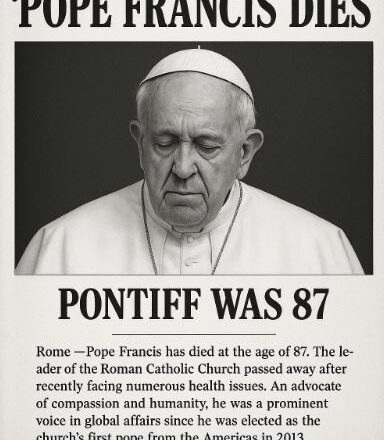Pope Francis has passed away. Pope Francis, born Jorge Mario Bergoglio, was the first Latin American pope and the first Jesuit leader in the history of the Church. His tenure brought sweeping reforms, a renewed focus on social justice, and deep conversations about the Church’s role in modern society. His passing at 88 years old on April 21, 2025, leaves behind a legacy of compassion, humility, and transformation that shaped the Catholic Church in ways few could have imagined.
Pope Francis: A Life of Faith, Reform, and Global Influence
Early Life and Path to Priesthood
Born on December 17, 1936, in Buenos Aires, Argentina, Jorge Mario Bergoglio grew up in a family of Italian immigrants, deeply rooted in faith and tradition. Unlike many religious leaders, Bergoglio first studied chemical engineering and worked in food processing before choosing a life devoted to faith. A powerful spiritual experience led him to join the Society of Jesus (Jesuits) in 1958.
His Jesuit training emphasized education, justice, and service to the poor. Over time, he pursued theology and philosophy, ultimately becoming a Catholic priest in 1969. His approach to faith was deeply personal. He believed in serving the poor, advocating for justice, and embracing humility as core principles of spiritual leadership.
Rising Through the Ranks
By 1973, Bergoglio became the Provincial Superior of the Jesuits in Argentina, leading the order during a period of political unrest. Argentina was facing the Dirty War, a time of military dictatorship and human rights abuses. Despite the dangers, he worked quietly to protect civilians and support vulnerable communities.
In 1992, he was appointed Auxiliary Bishop of Buenos Aires, eventually rising to Archbishop in 1998. Known for his humble lifestyle, he refused lavish housing, choosing instead to live in a modest apartment. He often traveled by public transport, engaging directly with underprivileged communities. His dedication led Pope John Paul II to elevate him to cardinal in 2001.
His Election as Pope
When Pope Benedict XVI resigned in 2013, the Church sought a leader who could reconnect with modern society. After much deliberation, Bergoglio was elected as the 266th pope. He chose the name Francis, honoring Saint Francis of Assisi, who symbolized peace, humility, and care for the environment.
His election was historic in many ways:
Read also: Jordan Lawlar MLB Potential: Rising Baseball Star
- He became the first non-European pope in over 1,300 years.
- He was the first Jesuit pope, bringing a unique intellectual and pastoral approach to leadership.
- He rejected traditional papal luxuries, opting to live in Casa Santa Marta, a modest Vatican guesthouse.
Major Achievements and Reforms
During his 12-year papacy, Pope Francis introduced major reforms that reshaped the Catholic Church.
- Fighting Poverty and Economic Inequality: He frequently spoke out against global wealth disparity, urging governments to address economic injustice.
- Environmental Protection and Climate Action: His 2015 encyclical, Laudato Si’, called for urgent climate action, emphasizing environmental stewardship as a moral duty.
- Church Transparency and Financial Accountability: He worked to clean up Vatican finances, increasing transparency and accountability.
- Interfaith Unity and Global Peace Efforts: Pope Francis built strong relationships with Muslim, Jewish, and Protestant leaders, advocating for religious harmony.
- LGBTQ+ and Women’s Inclusion: He encouraged a compassionate approach toward LGBTQ+ individuals, divorced Catholics, and women in leadership roles.
- Humanitarian Outreach and Crisis Support: He visited war-torn regions, promoted refugee rights, and urged global leaders to take action on humanitarian crises.
Challenges and Opposition
Despite his popularity among progressive Catholics, Pope Francis faced opposition from traditionalists. His stance on LGBTQ+ inclusion, modern liturgical practices, and financial transparency sparked controversy within conservative factions.
Though he made efforts to address clerical sexual abuse, critics argued that stronger measures were necessary. In his later years, he battled respiratory illnesses, including double pneumonia, leading to multiple hospitalizations.
Pope Francis passed away: Final Days and Legacy
Pope Francis passed away on Easter Monday, April 21, 2025, in Casa Santa Marta, Vatican City. His death was announced by Cardinal Kevin Farrell, who now oversees the Church’s transition period.
As the College of Cardinals prepares to elect his successor, the world reflects on his remarkable legacy—a legacy of faith, reform, and global impact.
Pope Francis changed the modern papacy, making the Church more accessible, transparent, and engaged with contemporary issues. His teachings will continue to inspire millions, leaving behind a blueprint for future leaders to embrace faith with compassion and courage.
SEO Keywords
- Pope Francis biography
- Pope Francis’s legacy
- Catholic Church reforms
- First Latin American pope
- Pope Francis achievements
- Vatican transparency
- Social justice in Catholic Church
- Pope Francis environmental advocacy
- Pope Francis’s death news
- Papacy of Pope Francis
- Pope Francis’s funeral details
- College of Cardinals election
- Pope Francis’s impact on Christianity
- Modern Catholic Church leadership
- Pope Francis’s humanitarian efforts
- Pope Francis passed away
Hashtags
#PopeFrancis #CatholicChurch #Vatican #Faith #SocialJustice #ChurchReform #EnvironmentalAdvocacy #Christianity #PapalLegacy #PopeFrancisDeath #GlobalLeadership #HumanitarianEfforts #ReligiousNews #ChristianFaith #VaticanNews
Read also: McCartney Kessler’s Rise in Pro Tennis
